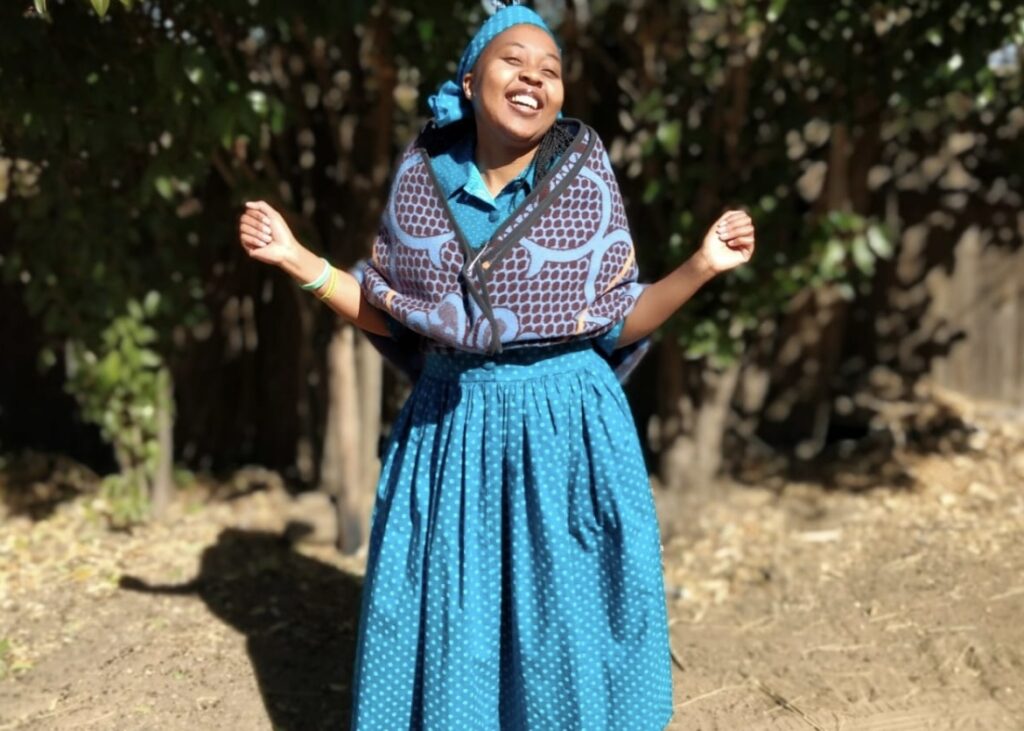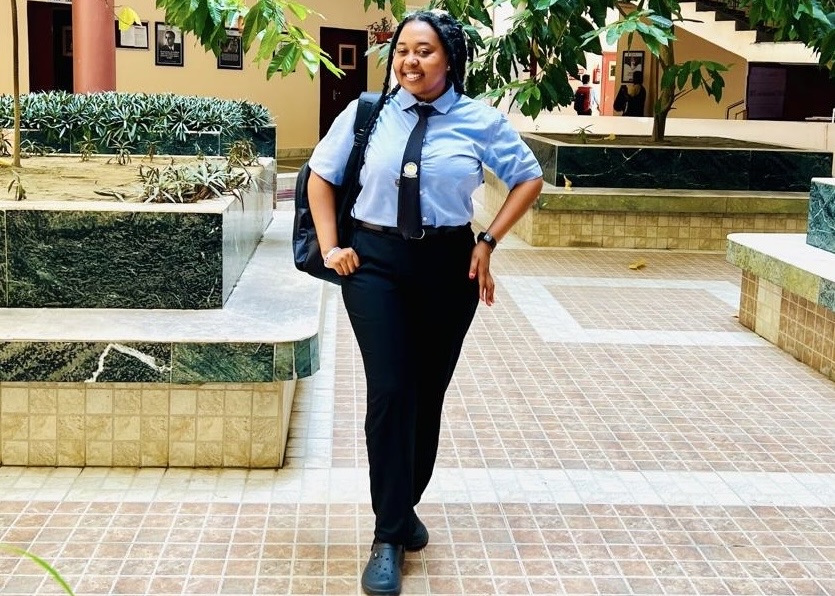“What keeps me motivated, first and foremost, is my child. I want to be a great example for her. ”
In this interview, we reconnect with Mapaseka to explore how her story has evolved since the publication of “Empowering Young Mothers.”
(If you haven’t read the original article, “Empowering Young Mothers,” you can catch up here [LINK])
Hi! My name is Karen and I am the interviewer. Thank you so much for coming back and reconnecting with our community—it’s really lovely to see you again!
I’m Mapaseka Maphama. I’m originally from Lesotho, a small landlocked country in Southern Africa, surrounded entirely by South Africa. Right now, I’ve been based in India since last year, where I’m pursuing my Master’s degree.
Wow, that’s amazing! I’m sure a lot has changed since your story was first published. I’m really looking forward to hearing your updates and reflections.
Reflecting on the Past
So first, I’d love to go back to around the time your story was published—back in 2020, right? What was your life like then? What were you working on at the time?
Yeah, I remember that time clearly. I was actually unemployed. I had worked from 2016 to 2017 on a project-based contract, but once that ended, I didn’t have a long-term job lined up.
Ah, I see. That must’ve been such a difficult transition, especially without stability.
Yeah, it was. But I’ve always believed that even if you’re not working, you shouldn’t stop growing. So during that gap, I tried to stay active and look for spaces where I could be productive and learn new things—workshops, soft skills training, and other programs that would help me grow.
That’s such a great mindset. You turned what could’ve been a discouraging time into a chance to grow.
Exactly. I didn’t want to just sit around waiting for a job, and then finally get one without having gained anything in the meantime. I really believe that any gap in your life isn’t just for lying around—it’s a chance to improve yourself in other ways.
I also started networking, and through that, I discovered international platforms and opportunities. Sometimes I’d meet someone who’d say, “Hey, have you heard of this program?” or I’d just stumble upon things on social media. Eventually, that’s how I found out about this opportunity and applied.

It’s amazing how staying open like that can lead you to the next step. Were there any emotional shifts you experienced during that time?
Emotionally, I won’t lie—I wasn’t in a great place. Unemployment is tough. But I had a lot of support from home and because of that, I was able to move around freely, attend programs, and participate fully. It helped me stay focused and hopeful.
You mentioned that you aspire to create an initiative to support young mothers and women in Lesotho.What inspired you to take action on this issue?
Actually, around that same time, I got involved in community service, and that’s when I came across some of the homes for young mothers in my country. Seeing how those spaces empower young women really stayed with me.
But honestly, my passion for this started even earlier—when I became a single mother myself at 21. I was still in university then, in my second or third year. It was such a hard time. Becoming a young mother is incredibly complicated. Emotionally, psychologically, physically, financially—you need support in every direction. And I realized just how much help young mothers actually need.
Wow… that must’ve been incredibly tough to go through while studying. But it also sounds like it gave you a very personal understanding of what young mothers go through.
Exactly. And it goes even deeper. I think I mentioned this in my dream story, but my parents were married for about 20 years—and it was never good. Eventually, they separated, and I watched my mother raise me and my brother alone, she did everything for us. Even though she came from a generation that didn’t really express emotions openly, I could see how it affected her. I could feel it.
It’s powerful how those experiences—both as a daughter and as a mother—shaped your path. So those experiences really pushed you to step up and support others?
Yes, definitely. The passion kept growing stronger. The more I reflected on it, the more I realized how deeply rooted the issue is. It’s what they call “generational trauma” in psychology. These patterns just keep repeating if nothing changes. That’s what really sparked the passion in me—to support young mothers.
Current Situation
Thanks so much for opening up about your past. Since you last shared your dream with us, how have things been going? I’d love to hear how life has unfolded since then!
One of the biggest turning points for me was starting a Master’s program in psychology. Through my own experiences, I came to realize that if you truly want to help someone, you first need to understand how to help them. Becoming a mother at a young age, there were so many moments when I thought, “If only I had this kind of support back then.” Those reflections became the driving force behind my decision to pursue a deeper understanding of psychology.
Of course, practical skills like how to earn a living are important, especially for young mothers who didn’t finish school. But what stood out to me the most was mental health. The trauma they’ve and even experienced affects their parenting, and without healing that, the cycle continues. I felt strongly that the real work begins there—helping them emotionally and psychologically so they can truly focus on their lives.
It really connects with your own experiences of trauma. You’re offering a perspective only someone who’s lived through it can bring.
Exactly. I’ve always believed that everything begins in the mind. Your thoughts shape your behavior, and that plays a huge role in where you end up in life. So it’s really important to understand what’s happening inside yourself.
Leaving my home country to pursue a master degree in India wasn’t an easy decision, since it meant being away from my daughter. But through studying psychology, I’ve started to gain concrete tools to truly support others—like understanding personality traits, identifying signs of psychological distress, and learning effective counseling techniques.

The knowledge you’ve been gaining must be such a powerful tool, not only for your future career but also for the way you support young women. So I’m curious. What do you think are the biggest challenges that young mothers or women in Lesotho are facing today?
Obviously, the biggest challenge is poverty. Poverty brings so many other issues into the picture such as education and teenage pregnancy. In my case, I came to pursue my Master’s on a scholarship, but I still have to cover a large portion of the fees myself. It’s a lot, and not many young people can afford that. So poverty ends up being the biggest barrier.
That really shows how poverty is at the root of so many connected issues. I wonder how that also affects their emotional wellbeing.
Mental health is another major challenge that often gets overlooked. There aren’t many professionals young mothers can turn to. And even when there are, the question becomes—how do I pay for counseling sessions? Mental health support often exists only in urban areas, so for those in rural communities, access is nearly impossible. The reality is that support isn’t reaching the people who need it the most.
That really highlights how poverty and emotional wellbeing are so intertwined.
To be continued…

